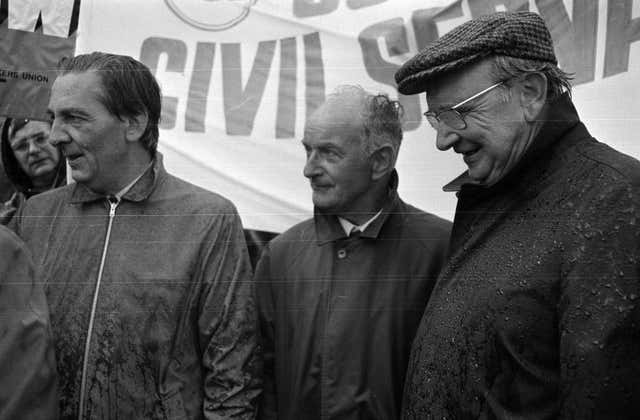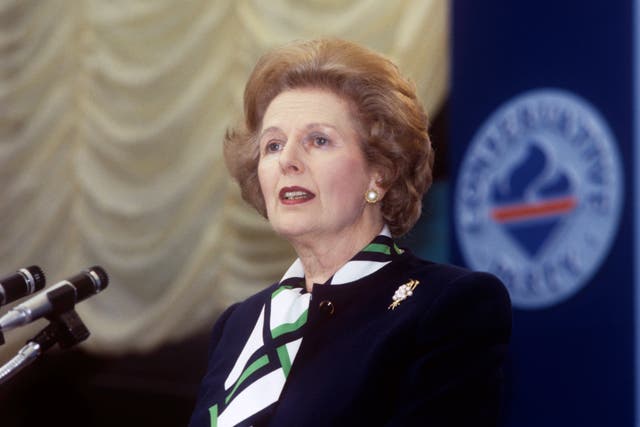
James Callaghan secretly urged officials to find ways of ousting left-wing trade union leaders causing trouble for the government “by one means or another”, according to newly-released official papers.
Files released by the National Archives show that as home secretary in Harold Wilson’s Labour government, Mr Callaghan was deeply concerned about the rise of a new generation of “politically motivated” union leaders.
In particular he singled out Jack Jones, the general secretary of the giant Transport and General Workers Union, and Hugh Scanlon, the leader of the engineering workers.
In response to his call, senior officials suggested undermining those with suspected communist leanings through “inspired leakages” to the press.
 Union leaders Hugh Scanlon (centre) and Jack Jones (right) with TUC general secretary Len Murray (PA)
Union leaders Hugh Scanlon (centre) and Jack Jones (right) with TUC general secretary Len Murray (PA)
The details are disclosed in a note of a meeting between the cabinet secretary Sir Burke Trend, the head of the Department of Employment Sir Denis Barnes, and James Waddell, a senior Home Office official, headed “Communism in Industry”.
Dated March 5 1969, it is marked “Secret and Personal” with only one copy to be retained.
It notes: “Sir Burke Trend recalled that the Home Secretary apparently had in mind that it might be possible by one means or another for the more ‘politically motivated’ trade union leaders – in particular Mr Scanlon and Mr Jack Jones – to be supplanted by others more orthodox; and it had been envisaged that further consideration might perhaps be given to this possibility.”
The officials were reluctant to act, fearing it could revive the controversy which erupted three years earlier when Mr Wilson denounced the leaders of a strike by seamen as “a tightly knit group of politically motivated men” leading to accusations ministers were using MI5 to spy on unions.
They did however suggest one possible course of action, noting: “Sir Denis Barnes said, however, that detailed exposure of Jones’ behaviour from time to time, perhaps by way of inspired leakages to the press, might be useful and productive.”
The proposal appears to have come to nothing – something Mr Callaghan may have looked back on with regret when, 10 years later, the strikes of the “winter of discontent” were widely blamed for the fall of his government.
The file also includes a note from foreign secretary George Brown to Mr Wilson explaining how the English Section of the Foreign Office’s secretive Information Research Department (IRD) – set-up to counter Soviet Cold War propaganda – carried out such selective briefings.
“By discreet dissemination of such papers to trusted contacts, eg to various Labour Party officials at Transport House over the years, and to selected journalists, the English Section has done much to expose the activities of Communist front organisations in Britain,” Mr Brown said.
 Margaret Thatcher feared Militant Tendency was trying to infiltrate the Civil Service (PA)
Margaret Thatcher feared Militant Tendency was trying to infiltrate the Civil Service (PA)
The files also show how, in 1974, the BBC director general Charles Curran invited the IRD to brief the Board of Governors on “the influence of subversive movements” in the field of broadcasting – although, with a general election looming, officials were doubtful about the idea.
“A leak that HMG was briefing the BBC on subversion might rebound in some perverse way related to the ‘reds under beds’ aspects of the last election period, and at any time it could be distorted into allegations of attempts to bring political influence to bear on the impartiality of the BBC,” one warned.
The files show that Mr Wilson was not the only prime minister concerned about subversive influence.
In 1985 Margaret Thatcher authorised the revival of the secretive Whitehall Subversion in Public Life committee – including representatives of MI5 – amid fears that the far left Militant Tendency (MT) was trying to infiltrate the Civil Service.
The prime minister was said to be “somewhat disquieted” to be told there were an estimated 1,400 MT members in the Civil Service – some in the ranks of management – who had shown themselves capable of causing disruption “out of all proportion to their numbers”.
Mrs Thatcher’s private secretary Nigel Wicks wrote she believed managers needed to be “very ready to sack subversive troublemakers if they showed any cause under Civil Service rules”.


Why are you making commenting on The Herald only available to subscribers?
It should have been a safe space for informed debate, somewhere for readers to discuss issues around the biggest stories of the day, but all too often the below the line comments on most websites have become bogged down by off-topic discussions and abuse.
heraldscotland.com is tackling this problem by allowing only subscribers to comment.
We are doing this to improve the experience for our loyal readers and we believe it will reduce the ability of trolls and troublemakers, who occasionally find their way onto our site, to abuse our journalists and readers. We also hope it will help the comments section fulfil its promise as a part of Scotland's conversation with itself.
We are lucky at The Herald. We are read by an informed, educated readership who can add their knowledge and insights to our stories.
That is invaluable.
We are making the subscriber-only change to support our valued readers, who tell us they don't want the site cluttered up with irrelevant comments, untruths and abuse.
In the past, the journalist’s job was to collect and distribute information to the audience. Technology means that readers can shape a discussion. We look forward to hearing from you on heraldscotland.com
Comments & Moderation
Readers’ comments: You are personally liable for the content of any comments you upload to this website, so please act responsibly. We do not pre-moderate or monitor readers’ comments appearing on our websites, but we do post-moderate in response to complaints we receive or otherwise when a potential problem comes to our attention. You can make a complaint by using the ‘report this post’ link . We may then apply our discretion under the user terms to amend or delete comments.
Post moderation is undertaken full-time 9am-6pm on weekdays, and on a part-time basis outwith those hours.
Read the rules hereLast Updated:
Report this comment Cancel